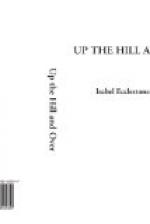There had been an inquest, of course, and at the inquest the whole sad affair was supposed to have been made plain. It was simplicity itself. Simplicity, in fact, was its most annoying characteristic. Mrs. Coombe, it appeared, had been for a long time somewhat of a sufferer from an obscure trouble, referred to generally as “nerves.” For the relief of this trouble, one of whose symptoms was insomnia, she had, from time to time, had recourse to narcotics which, as everyone knows, are dangerous, if not, as many thought, positively immoral. Undoubtedly the poor lady had died from an overdose. It was easy, the coroner said, for a sympathetic mind to reconstruct the details of the terrible occurrence. It was the night before the wedding and the deceased had retired early. Miss Milligan, who had run in for a last look at the wedding gown, and who had been the very last person to see and speak with her, deposed that she had appeared more than ordinarily tired and seemed anxious to be alone. Asked if she detected any other signs of disordered nerves the witness had said, no. The deceased had not appeared worried about anything? No. The wedding gown had been quite satisfactory? Quite.
No more questions were asked and Miss Milligan had not thought it necessary to go into the matter of the getting of the nerve tonic. The dead woman’s harmless little deception was safe in her hands. It hadn’t anything to do with the case anyway. Although in her own heart Miss Milligan blamed Dr. Callandar severely for not allowing the poor woman to use her tonic constantly. Had he done so the final tragedy might never have happened. Needless to say this good lady never knew what she had done. The fact that Mary Coombe had been a drug victim under treatment did not come out at the inquest. The coroner knew, but he was a sensible man and a very kind one. It hardly needed the logical arguments of Miss Philps or the heart-broken entreaties of Esther to convince him that knowledge of this fact was not for the general public. The only legally necessary information was the cause of death and that was simple enough. Easily understood, too, for given a tendency to sleeplessness and the excitement incident to a wedding, what more natural than that the excited bride should have sought relief in her customary sleeping draught.
The mistake, the taking of a lethal dose, was, as all such mistakes are, inexplicable. Did her hand shake? Had she miscounted the number of tablets? Had she, in her nervous state, deliberately risked a larger dose whose danger she did not realise? These questions would never be answered. She had been alone in her room, nor was there a thread of evidence upon which to hang a theory. Esther, the nurse, Jane, Dr. Callandar (poor man!) had noticed nothing out of the ordinary when they had parted from her that last time. Aunt Amy’s evidence was not taken. No one thought to question her and she volunteered no information. Of all the household at the Elms she was least disturbed by the tragedy, but, naturally, one does not expect the mentally weak to realise sorrow like ordinary people. This exemption was, as many did not fail to remark, one of their compensations. So in this, as in other things, Aunt Amy did not matter. She went her quiet way undisturbed, the one contented and peaceful person in that house of shock and horror.




